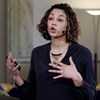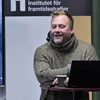fonds

The (New) Case for Wage-Earner Funds
Research seminar with Markus Furendal, Post-Doc in Political Science, Stockholm University, and Martin O'Neill, Professor of Philosophy at University of York. Abstract In our presentation we make the
Axel Gosseries
I am a philosopher and law scholar, visiting professor at the Institute for Future Studies. I am a Maitre de recherches at the Fonds de la Recherche Scientifique (Brussels) and a professeur extraordin
Rethinking intimacy: Semi-anonymous spaces and transitory attachments in Argentine tango dancing
Current Sociology, 66(3), pp. 356-372. doi.org/10.1177/0011392116681385 Abstract Although intimacy is an area characterized by great variety and complexity, both popular and academic discourses have tra
Positive online emotions
Is it possible to study emotions using mathematical models? Frank Schweizer is one of the resesarchers who have tried and he finds for example that we are quite nice to each other online. He came to te
The Importance of Age for the Reallocation of Labor: Evidence from Swedish Linked Employer-Employee Data 1986-2002
Using employer-employee data covering the whole Swedish economy from 1986 to 2002, this paper examines how job- and worker flows have been distributed across age groups. It finds that the flows vary b

How much crime can foreign background explain? with Amber Beckley
Can the number of people with foreign background living in an area explain the level of crime in that same area? In this talk Amber Beckley gives us the numbers and finds a correlation that points cle

Mårten Schultz: Risk and responsibility
Legal responsibility comes in different forms. Private law deals with questions of responsibility for harm that someone causes another. The responsibility requires three things: That someone was harme
Research areas
The Institute for Futures Studies is an institute for social science research focusing on issues deemed important for the future.
Mårten Schultz: Risk and responsibility (webinar)
Mårten Schultz is professor of law at Stockholm UniversityAbstractLegal responsibility comes in different forms. Private law deals with questions of responsibility for harm that someone causes another.








